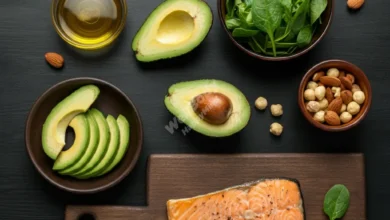12 Superfoods That Can Help Improve Your Immunity
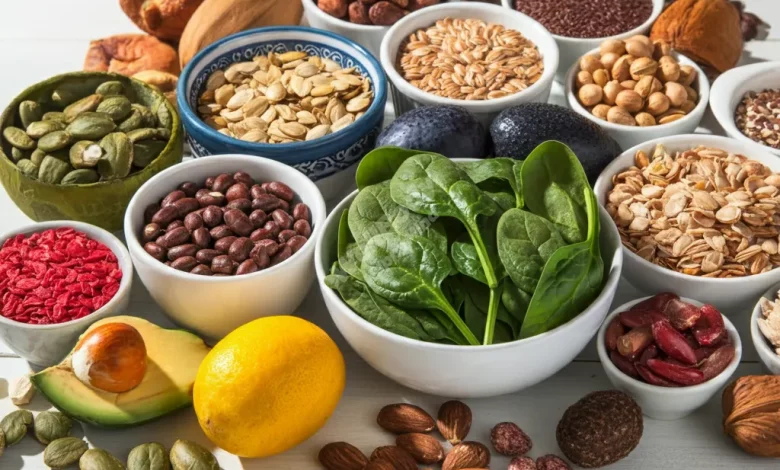
Did you know that what you eat can be your body’s best defense against illness? Welcome to the world of immune-boosting superfoods! These nutritional powerhouses are not just delicious; they’re packed with vitamins, minerals, and antioxidants that can give your immune system a much-needed boost.
In today’s fast-paced world, maintaining a strong immune system is more important than ever. It’s our body’s natural shield against harmful bacteria, viruses, and other pathogens. But here’s the exciting part: you can strengthen this shield right from your kitchen!
In this post, we’ll explore 12 amazing superfoods that can help supercharge your immunity. From zesty citrus fruits to omega-rich salmon, these foods are not only tasty but also pack a powerful punch when it comes to keeping you healthy. Ready to discover nature’s immune boosters? Let’s dive in!
Understanding Immunity and Nutrition
Our immune system is like a complex network of defenders, constantly working to protect our body from harmful invaders. It’s made up of various cells, tissues, and organs that work together to identify and neutralize threats.
But did you know that what you eat plays a crucial role in how well this system functions? That’s right – nutrition and immunity are closely linked. Here’s why:
- Balanced diet: A well-rounded diet provides the essential nutrients your immune system needs to operate at its best.
- Vitamin power: Vitamins like C, D, and E are key players in supporting immune function.
- Mineral might: Minerals such as zinc and selenium help your body produce and activate immune cells.
- Gut health: A healthy gut, supported by a good diet, is crucial for a strong immune system.
By focusing on nutrient-rich foods, especially those we call “superfoods,” you can give your immune system the tools it needs to keep you healthy. Remember, no single food is a magic bullet – it’s the overall balance and variety in your diet that counts!
What Makes a Food “Super” for Immunity?
When we talk about superfoods for immunity, we’re referring to foods that are exceptionally rich in nutrients that support our immune system. But what exactly makes a food “super” in this context?
Superfoods for immunity typically:
- Are nutrient-dense: They pack a lot of beneficial nutrients in relatively small portions.
- Contain key immune-boosting components: These include:
- Vitamins: Especially A, C, D, and E
- Minerals: Such as zinc, selenium, and iron
- Antioxidants: Like flavonoids and carotenoids
- Healthy fats: Particularly omega-3 fatty acids
- Fiber: Which supports gut health and, by extension, immune function
- Offer multiple health benefits: Beyond just supporting immunity, they often provide other health advantages.
- Are easily incorporated into a daily diet: They’re usually accessible and can be included in various meals and recipes.
It’s important to note that the term “superfood” isn’t a scientific classification. Rather, it’s a popular way to describe foods that are particularly nutrient-rich and beneficial for health. When it comes to immunity enhancement, these foods can play a significant role in supporting your body’s natural defenses.
12 Superfoods to Boost Your Immune System
1. Citrus Fruits
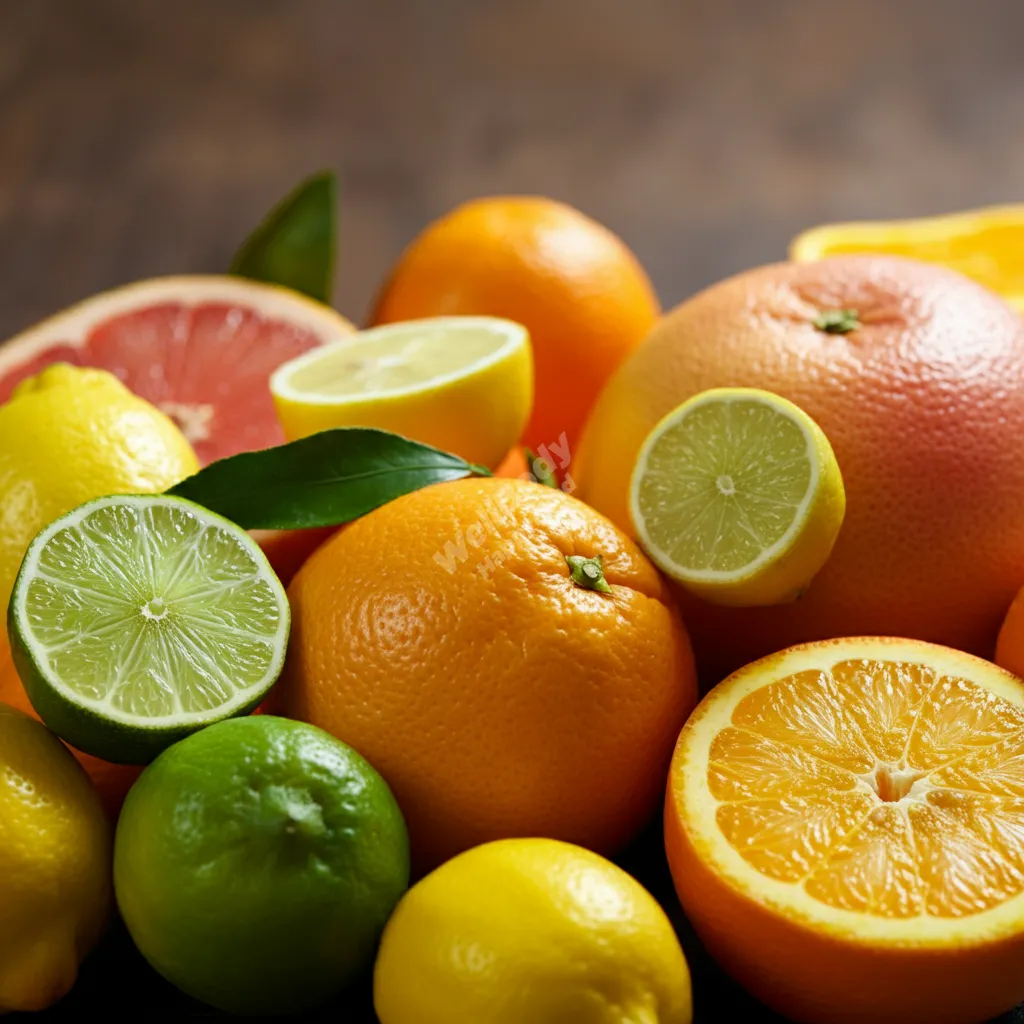
Citrus fruits are often the first thing that comes to mind when we think about boosting our immune system, and for good reason!
Types of citrus fruits:
- Oranges
- Lemons
- Limes
- Grapefruits
- Tangerines
Why they’re super:
Citrus fruits are packed with Vitamin C, a powerful antioxidant known for its immune-boosting properties. Vitamin C helps stimulate the production and function of white blood cells, which are key players in fighting off infections.
Benefits for immunity:
- Increases production of white blood cells
- Protects cells from damage by free radicals
- Helps in the absorption of iron, another important nutrient for immunity
Ways to incorporate citrus fruits into your diet:
- Start your day with a glass of fresh orange juice
- Add lemon slices to your water for a refreshing drink
- Use lime juice in salad dressings or marinades
- Enjoy grapefruit as a snack or add it to your breakfast
- Toss orange segments into your salads for a sweet and tangy twist
Pro tip: To get the most vitamin C, eat citrus fruits raw. Cooking can reduce their vitamin C content.
Remember, while citrus fruits are excellent for immunity, they’re just one piece of the puzzle. A balanced diet with a variety of nutrients is key to optimal immune function.
2. Berries

Berries are not only delicious but also pack a powerful punch when it comes to immune-boosting properties. These colorful fruits are true superfoods for your immune system.
Types of berries:
- Strawberries
- Blueberries
- Raspberries
- Blackberries
- Goji berries
Why they’re super:
Berries are rich in antioxidants, particularly a type called flavonoids. These compounds help protect your cells from damage and have been shown to boost immune function.
Benefits for immunity:
- High in Vitamin C, which supports immune cell function
- Contain anthocyanins, powerful antioxidants that reduce inflammation
- Provide fiber, which promotes gut health and indirectly supports immunity
Easy ways to add berries to your meals:
- Top your morning cereal or oatmeal with a handful of mixed berries
- Blend them into smoothies for a nutrient-packed drink
- Add them to yogurt for a healthy snack
- Use them as a natural sweetener in baked goods
- Toss them into salads for a burst of flavor and nutrition
Pro tip: Frozen berries are just as nutritious as fresh ones and are available year-round. They’re perfect for smoothies and baked goods.
Fun fact: Blueberries, in particular, have been dubbed a “cognitive superfood” due to their potential benefits for brain health, in addition to their immune-boosting properties.
Remember, variety is key. Try to include different types of berries in your diet to benefit from their unique nutrient profiles.
3. Garlic
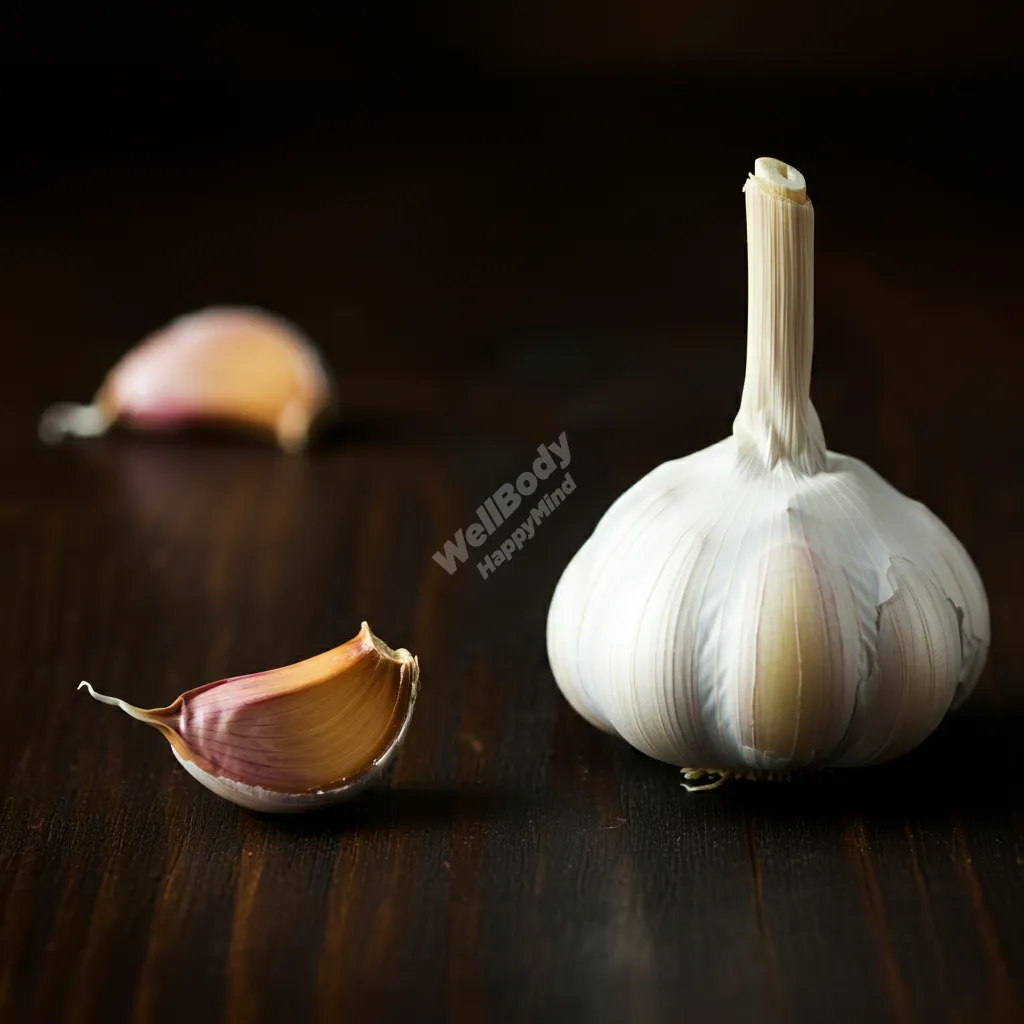
Garlic isn’t just a flavorful addition to your meals; it’s also a powerful immune booster that has been used for its medicinal properties for thousands of years.
Why it’s super:
Garlic contains allicin, a compound that gives it its distinctive smell and taste. Allicin is known for its potent antimicrobial and antiviral properties.
Active compounds in garlic:
- Allicin
- Diallyl sulfide
- S-allyl cysteine
Immune-boosting properties:
- Stimulates the production of white blood cells
- Has natural antibacterial and antiviral effects
- Helps reduce the severity and duration of common illnesses like the flu
Tips for using garlic in cooking:
- Crush or chop garlic and let it sit for 10-15 minutes before cooking to activate its beneficial compounds
- Add raw garlic to salad dressings or homemade sauces for maximum benefits
- Roast whole garlic bulbs for a milder, sweeter flavor
- Add minced garlic to soups, stews, and stir-fries in the last few minutes of cooking
- Try garlic supplements if you find the taste too strong (consult with a healthcare provider first)
Pro tip: To get the most health benefits, consume garlic raw or lightly cooked. Overcooking can reduce its beneficial properties.
Fun fact: During World War I, garlic was used as an antiseptic to prevent gangrene in soldiers’ wounds.
Remember, while garlic is a powerful immune booster, it’s most effective when combined with other healthy lifestyle habits and a balanced diet.
4. Ginger
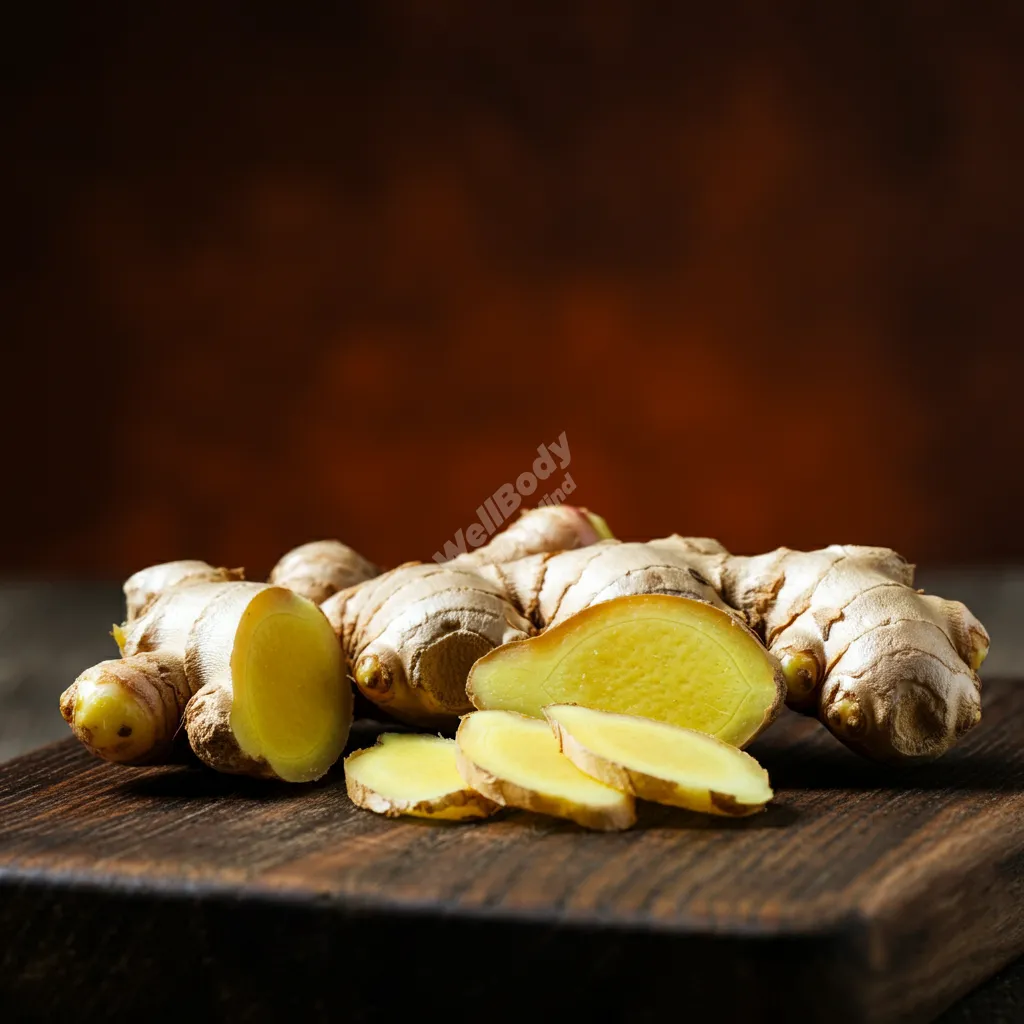
Ginger is not just a spicy addition to your meals; it’s a powerful natural immune booster with a long history of medicinal use.
Medicinal properties of ginger:
- Anti-inflammatory: Helps reduce inflammation in the body
- Antioxidant: Protects cells from damage
- Antimicrobial: May help fight certain bacteria and viruses
How it supports immune function:
- Reduces inflammation, which can help the immune system function more effectively
- Contains compounds like gingerols and shogaols that have immune-boosting effects
- May help reduce the risk of some chronic diseases, indirectly supporting overall health
Various ways to consume ginger:
- Fresh ginger tea: Steep sliced ginger in hot water
- Ginger shots: Blend fresh ginger with lemon juice and a touch of honey
- In cooking: Add grated ginger to stir-fries, soups, or curries
- Pickled ginger: Often served with sushi, but great as a general condiment
- Ginger supplements: Available in capsule or powder form (consult a healthcare provider before taking)
Pro tip: To maximize ginger’s benefits, try consuming it in its raw form or lightly cooked. You can store peeled ginger in the freezer to make it last longer and make grating easier.
Fun fact: Ginger has been used in traditional medicine for over 3,000 years, making it one of the oldest medicinal foods known to humans.
Remember, while ginger is a potent immune booster, it’s most effective when part of a balanced diet and healthy lifestyle.
5. Spinach
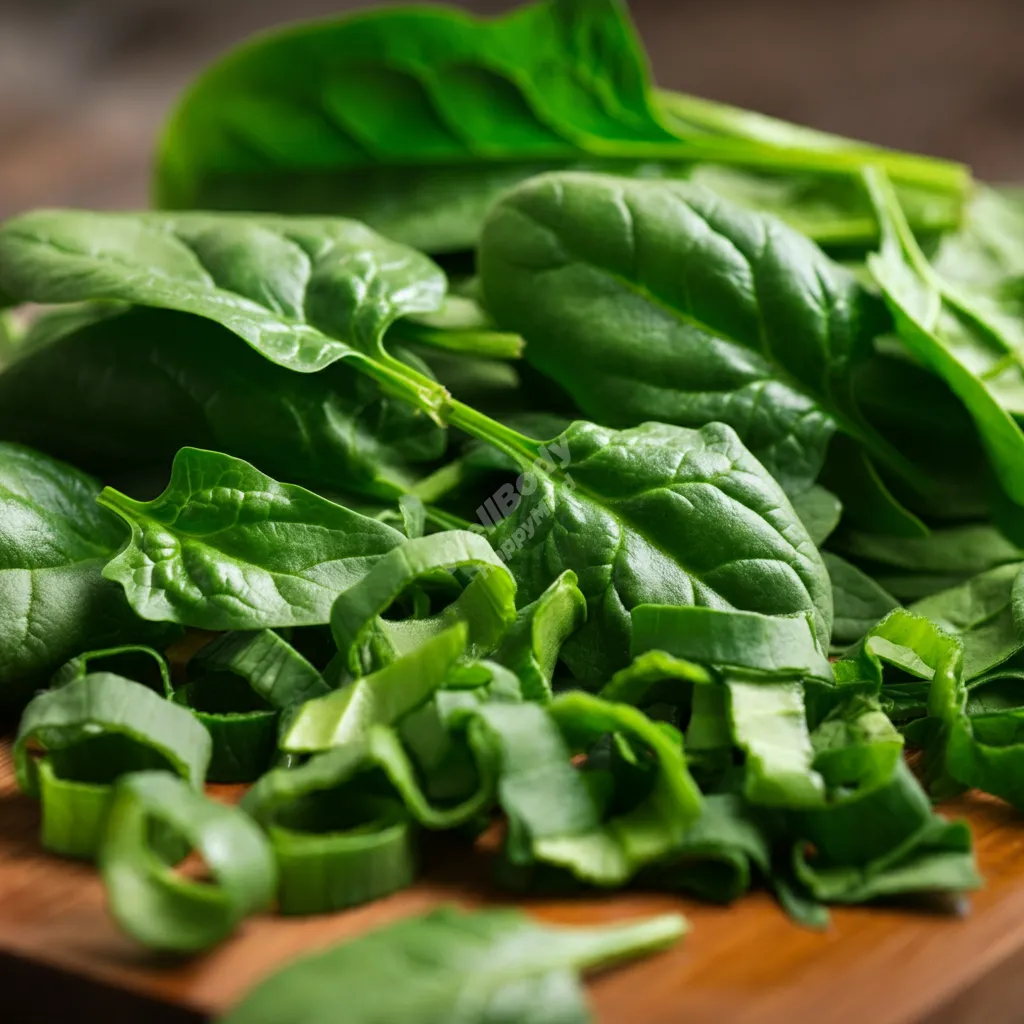
Spinach is a nutrient-dense leafy green that truly deserves its superfood status, especially when it comes to boosting immunity.
Nutrient profile of spinach:
- High in Vitamin C, Vitamin K, and Vitamin A
- Rich in iron and folate
- Contains antioxidants like lutein and zeaxanthin
Benefits for immune health:
- Vitamin C enhances the function of immune cells
- Vitamin A helps maintain the health of your intestines, an important part of your immune defense
- Antioxidants protect immune cells from damage
- Iron is crucial for the normal development of immune cells
Cooking methods that preserve nutrients:
- Steaming: Light steaming preserves most nutrients
- Quick sautéing: Brief cooking with a small amount of healthy oil
- Raw: Add to salads or smoothies for maximum nutrient retention
- Blanching: Briefly immerse in boiling water, then quickly cool
Pro tips:
- Add a squeeze of lemon juice to cooked spinach to enhance iron absorption
- Pair spinach with foods high in Vitamin C to boost iron absorption
- Frozen spinach is just as nutritious as fresh and is convenient for smoothies and cooked dishes
Fun fact: Spinach contains more nutrients when cooked, but in smaller quantities due to shrinkage. One cup of cooked spinach is equivalent to about 7 cups of raw spinach!
Remember, while spinach is incredibly nutritious, variety in your diet is key. Rotate spinach with other leafy greens for a wide range of nutrients.
6. Yogurt
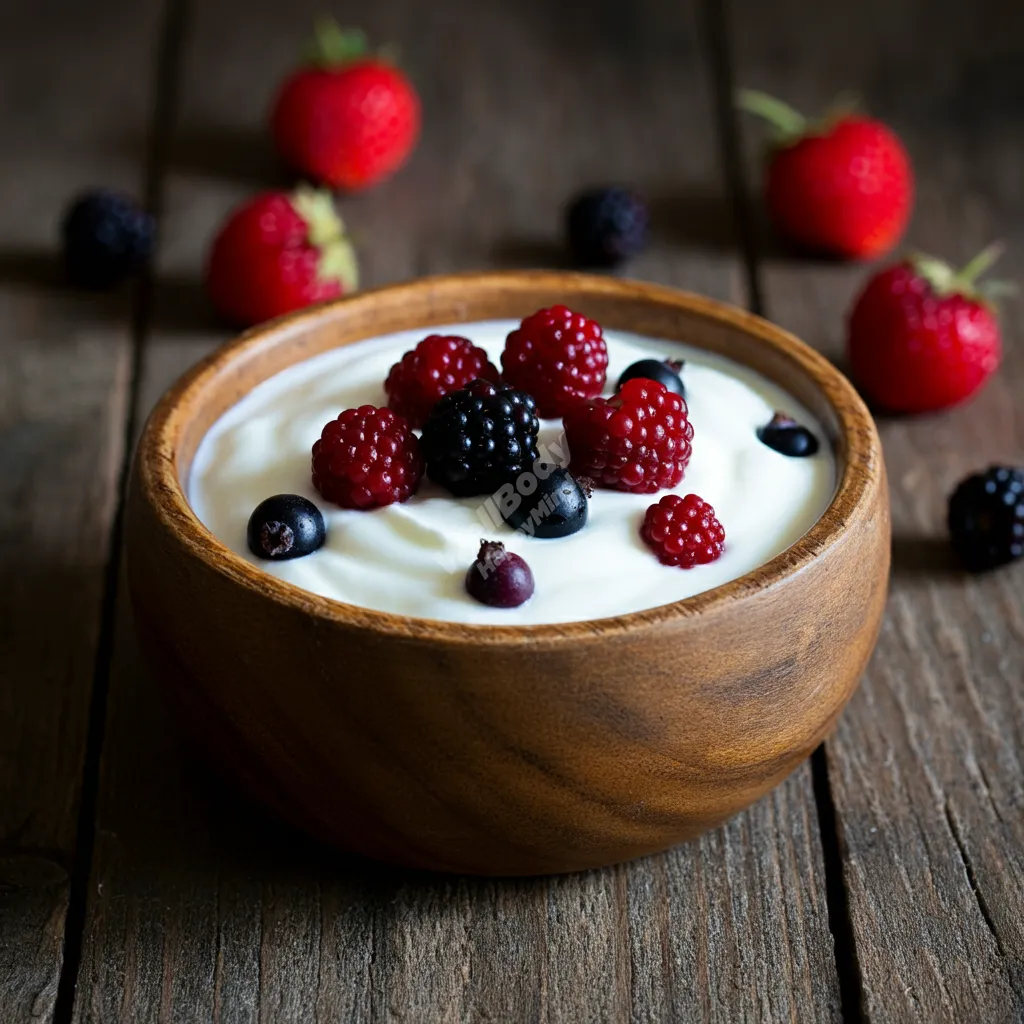
Yogurt is not just a delicious snack; it’s a probiotic powerhouse that can significantly contribute to your immune health.
Probiotics and gut health:
- Yogurt contains live cultures or probiotics
- These are beneficial bacteria that support gut health
- A healthy gut is crucial for a strong immune system
Connection between gut health and immunity:
- About 70-80% of immune cells reside in the gut
- Probiotics help maintain a balanced gut microbiome
- A healthy microbiome supports overall immune function
Choosing the right yogurt for immune benefits:
- Look for labels that say “live and active cultures“
- Opt for plain yogurt to avoid added sugars
- Turkish yogurt often has more protein, which is also important for immunity
- Consider non-dairy options like coconut or almond milk yogurt if you’re lactose intolerant
Ways to incorporate yogurt into your diet:
- Use as a base for smoothies
- Top with fresh fruits and nuts for a healthy breakfast
- Use as a substitute for sour cream in recipes
- Make a yogurt-based dip for vegetables
Pro tip: For an extra immune boost, add a drizzle of honey to your yogurt. Honey has its own antimicrobial properties.
Fun fact: The bacteria in yogurt can help your body produce vitamin B12, which is crucial for red blood cell formation and neurological function.
Remember, while yogurt is beneficial, it’s most effective as part of a balanced diet rich in various nutrients.
7. Almonds

Almonds are not just a tasty snack; they’re a nutrient-dense superfood that can play a significant role in supporting your immune system.
Vitamin E content and its role in immunity:
- Almonds are rich in Vitamin E, a powerful antioxidant
- Vitamin E helps protect immune cells from damage
- It enhances the body’s immune response, particularly in older adults
Other beneficial nutrients in almonds:
- Protein: Essential for building and repairing tissues, including immune cells
- Fiber: Supports gut health, which is crucial for immunity
- Healthy fats: Help absorb fat-soluble vitamins (A, D, E, K)
- Magnesium: Important for many bodily functions, including immune response
Healthy ways to incorporate almonds into your diet:
- Enjoy a handful as a quick snack
- Add sliced almonds to your morning cereal or oatmeal
- Use almond flour in baking for a nutrient boost
- Spread almond butter on whole-grain toast
- Toss chopped almonds into salads for extra crunch
Pro tip: Soak almonds overnight to make them easier to digest and potentially increase nutrient absorption.
Fun fact: It takes about 1.1 gallons of water to grow a single almond, but almonds are still considered a water-efficient source of protein compared to many animal sources.
Remember, while almonds are nutritious, they’re also calorie-dense. A serving size is about 23 almonds or 1 ounce.
8. Turmeric
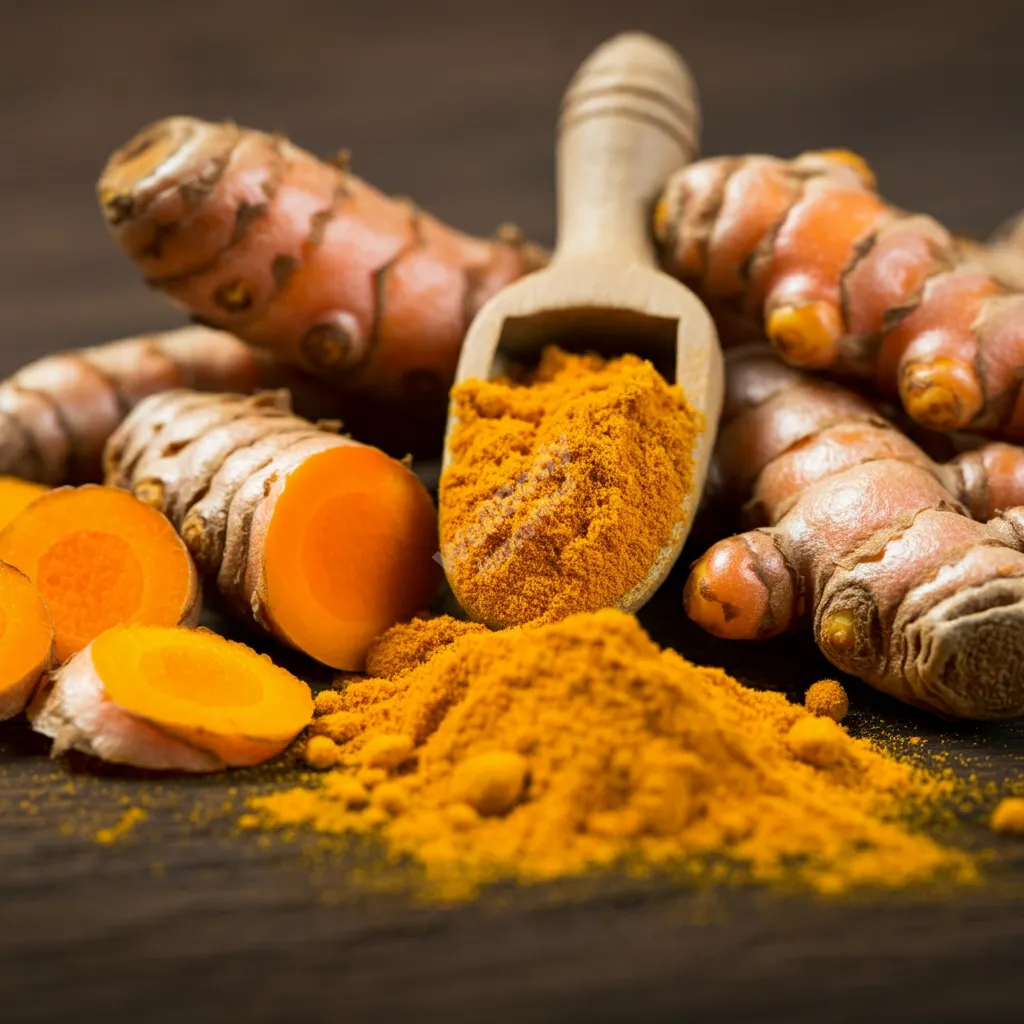
Turmeric, the golden spice that gives curry its vibrant color, is more than just a culinary delight. It’s a powerful anti-inflammatory and immune-boosting superfood.
Active compound: Curcumin
- Curcumin is the main active ingredient in turmeric
- It’s responsible for most of turmeric’s health benefits
- Known for its strong anti-inflammatory and antioxidant properties
Anti-inflammatory and immune-boosting properties:
- Helps regulate the immune system
- May enhance antibody responses
- Supports the activation of immune cells
- Potentially helps in managing autoimmune conditions
How to increase turmeric absorption:
- Always pair turmeric with black pepper
- Black pepper contains piperine, which enhances curcumin absorption by up to 2000%
- Consume turmeric with a source of healthy fat (e.g., coconut oil, olive oil) to improve absorption
Ways to incorporate turmeric into your diet:
- Add to curries, soups, and stews
- Make golden milk (turmeric latte)
- Blend into smoothies
- Use in egg dishes like scrambled eggs or frittatas
- Mix into rice for a colorful, flavorful side dish
Pro tip: For maximum benefits, aim for 1/2 to 1 teaspoon of turmeric per day, always paired with black pepper and a source of fat.
Fun fact: Turmeric has been used in Ayurvedic medicine for thousands of years to treat a variety of conditions, from wound healing to digestive issues.
Remember, while turmeric is beneficial, it’s most effective when part of a balanced, nutrient-rich diet.
9. Green Tea

Green tea isn’t just a soothing beverage; it’s a powerhouse of antioxidants that can significantly boost your immune system.
Antioxidants in green tea:
- Rich in polyphenols, particularly catechins
- The most potent catechin is EGCG (Epigallocatechin gallate)
- These compounds have powerful anti-inflammatory and antioxidant effects
Immune-enhancing effects:
- Supports T-cell production, helping the body fight off infection
- May increase the production of compounds that combat cell damage
- Helps maintain a healthy balance of good bacteria in the gut
Tips for brewing the perfect cup of green tea:
- Use water that’s hot but not boiling (around 160-180°F)
- Steep for 2-3 minutes to avoid bitterness
- Use about 1 teaspoon of tea leaves per cup of water
- Try different varieties like sencha, matcha, or genmaicha for varied flavors
Ways to incorporate green tea into your routine:
- Drink 2-3 cups per day
- Use matcha powder in smoothies or baked goods
- Try cold-brewed green tea for a refreshing summer drink
- Use cooled green tea as a base for marinades or dressings
Pro tip: To maximize the health benefits, drink your green tea without milk. Some studies suggest that milk proteins can bind to the beneficial compounds in tea, reducing their effectiveness.
Fun fact: Green tea contains L-theanine, an amino acid that can promote relaxation and potentially enhance the function of gamma delta T cells, which are important for immune function.
Remember, while green tea is beneficial, it does contain caffeine. If you’re sensitive to caffeine, consider limiting your intake, especially in the evening.
10. Sweet Potatoes
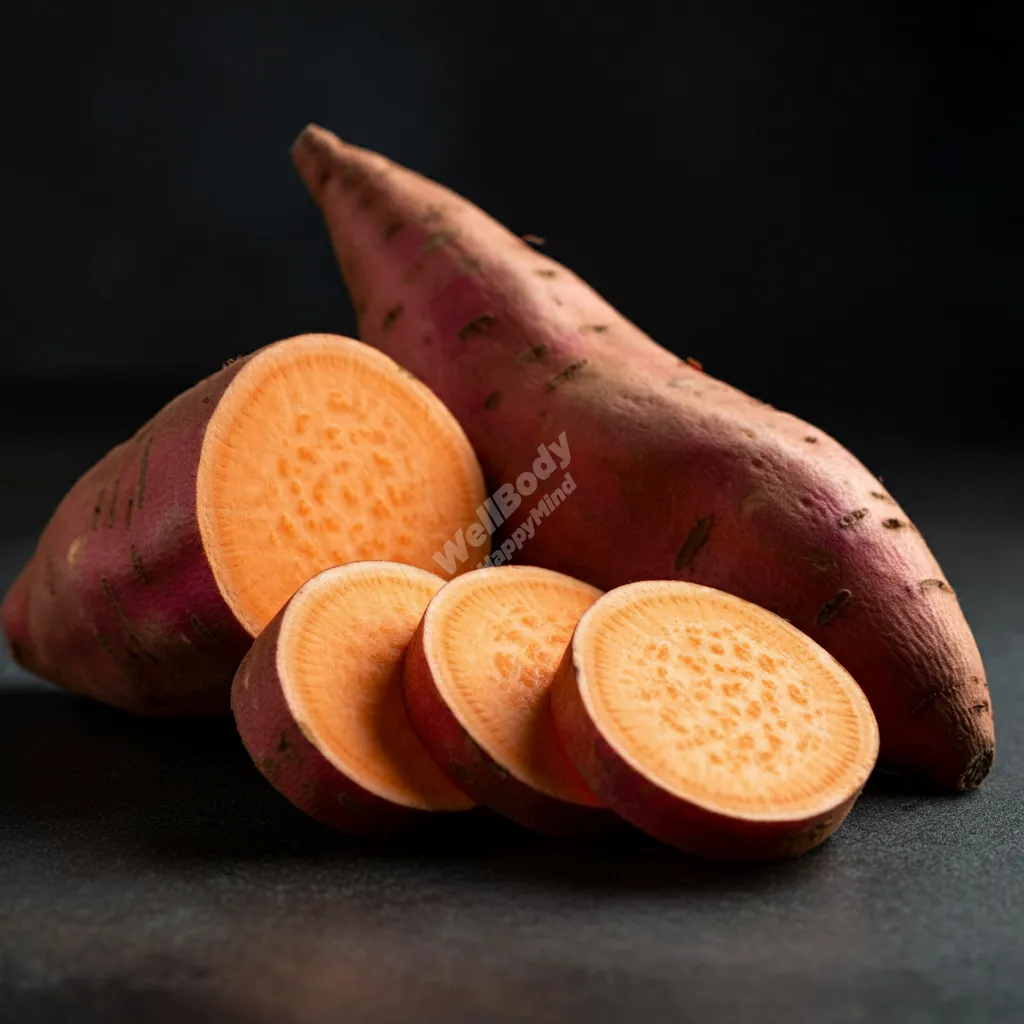
Sweet potatoes are not only delicious but also a nutritional powerhouse that can significantly boost your immune system.
Beta-carotene and vitamin A content:
- Sweet potatoes are rich in beta-carotene, which your body converts to vitamin A
- One medium sweet potato can provide over 100% of your daily vitamin A needs
- Vitamin A is crucial for maintaining the health of your skin and mucous membranes, your body’s first line of defense against pathogens
Role in immune function:
- Helps create and maintain protective barriers against infections
- Supports the production and function of immune cells
- Acts as an antioxidant, protecting cells from damage
Other immune-boosting nutrients in sweet potatoes:
- Vitamin C: Supports various cellular functions of the immune system
- Vitamin E: A powerful antioxidant that helps protect cells from damage
- Fiber: Supports gut health, which is crucial for overall immunity
Healthy cooking methods for sweet potatoes:
- Baking: Preserves most nutrients and enhances flavor
- Steaming: Quick and retains more nutrients than boiling
- Roasting: Brings out natural sweetness
- Mashing: Great for adding to other dishes
Pro tip: Leave the skin on when cooking sweet potatoes. The skin contains additional nutrients and fiber.
Fun fact: Despite their name, sweet potatoes are not closely related to regular potatoes. They belong to the morning glory family, while regular potatoes are part of the nightshade family.
Remember, while sweet potatoes are nutritious, they’re also high in carbohydrates. Enjoy them as part of a balanced diet for optimal health benefits.
11. Kiwi

Kiwi might be small, but it’s packed with nutrients that make it a powerful immune-boosting superfood.
Unique nutrient profile:
- Exceptionally high in Vitamin C (even more than oranges per gram)
- Rich in Vitamin K
- Good source of potassium and fiber
- Contains antioxidants like lutein and zeaxanthin
Immune-boosting properties:
- High Vitamin C content supports the production and function of white blood cells
- Antioxidants help protect immune cells from damage
- Fiber supports gut health, which is crucial for overall immunity
- Enzymes in kiwi may help reduce inflammation in the body
Creative ways to eat kiwi:
- Eat it whole (yes, the skin is edible and nutritious!)
- Slice and add to fruit salads or green salads
- Blend into smoothies for a tangy kick
- Use as a natural meat tenderizer (the enzymes break down proteins)
- Make kiwi salsa for a unique topping on fish or chicken
Pro tip: To quickly ripen kiwis, place them in a paper bag with an apple or banana. The ethylene gas released by these fruits will speed up the ripening process.
Fun fact: Kiwis are actually berries! They’re also known as “Chinese gooseberries” and are the national fruit of New Zealand.
Remember, while kiwis are highly nutritious, some people may be allergic to them. If you’ve never had kiwi before, start with a small amount to ensure you don’t have any adverse reactions.
12. Salmon

Salmon is not just a delicious fish; it’s a nutrient-dense superfood that can significantly boost your immune system.
Omega-3 fatty acids and their immune benefits:
- Salmon is rich in omega-3 fatty acids, particularly EPA and DHA
- These fatty acids help reduce inflammation in the body
- They enhance the function of immune cells, including B cells, T cells, and macrophages
- Omega-3s may help protect against autoimmune diseases
Other nutrients in salmon that support immunity:
- Vitamin D: Crucial for immune function and often lacking in many diets
- Selenium: An antioxidant that helps lower oxidative stress in your body
- Protein: Essential for building and repairing body tissues, including immune cells
- B vitamins: Important for cellular function and energy production
Recommended serving size and frequency:
- Aim for 2-3 servings (3-4 ounces each) of salmon per week
- Choose wild-caught salmon when possible for higher nutrient content
Ways to incorporate salmon into your diet:
- Grill or bake with lemon and herbs for a simple, healthy meal
- Add smoked salmon to your breakfast or brunch
- Use canned salmon in salads or sandwiches
- Make salmon patties or burgers for a fun twist
- Try salmon sushi or sashimi (from reputable sources)
Pro tip: When cooking salmon, avoid high-heat methods like deep frying, which can destroy some of the beneficial omega-3s.
Fun fact: Salmon get their pink color from eating krill and other tiny shellfish, which contain a pink-colored compound called astaxanthin.
Remember, while salmon is highly nutritious, it’s important to be mindful of mercury levels. Opt for salmon from lower-mercury sources and vary your fish intake.
How to Incorporate These Superfoods into Your Diet

Now that we’ve explored our 12 immune-boosting superfoods, let’s discuss how to effectively include them in your daily meals.
Meal planning tips:
- Aim for variety: Try to include at least 3-4 different superfoods in your diet each day.
- Color your plate: The more colorful your meals, the more diverse nutrients you’re likely getting.
- Prep in advance: Wash and chop vegetables, cook grains, or prepare smoothie packs for easy use during the week.
- Start small: If you’re not used to these foods, introduce them gradually to your diet.
Simple recipes featuring multiple superfoods:
Immune-Boosting Smoothie Bowl
- Blend: Greek yogurt, spinach, berries, and a small piece of ginger
- Top with: sliced kiwi, almonds, and a sprinkle of turmeric
Superfood Salad
- Base: Spinach leaves
- Add: Grilled salmon, orange segments, sliced almonds
- Dressing: Olive oil, lemon juice, minced garlic, and a touch of honey
Golden Milk Latte
- Heat almond milk with turmeric, ginger, a pinch of black pepper, and honey to taste
- Enjoy as a soothing, immune-boosting beverage before bed
Importance of variety and balance:
- Rotating these superfoods ensures you get a wide range of nutrients
- Remember, no single food can provide all the nutrients you need
- Combine these superfoods with other healthy foods for a well-rounded diet
Pro tip: Keep frozen berries, spinach, and salmon on hand for quick and easy meal additions when fresh options aren’t available.
Remember, the key to reaping the benefits of these superfoods is consistency. Try to make them a regular part of your diet rather than occasional additions.
Beyond Superfoods: Other Factors for a Strong Immune System

While superfoods play a crucial role in boosting immunity, it’s important to remember that they’re just one piece of the puzzle. A holistic approach to immune health involves several other key factors:
1. Sleep
- Aim for 7-9 hours of quality sleep per night
- During sleep, your body produces and distributes key immune cells
- Lack of sleep can make you more susceptible to illness
2. Exercise
- Regular moderate exercise can boost your immune system
- Aim for at least 150 minutes of moderate activity per week
- Exercise helps flush bacteria out of your lungs and airways
3. Stress Management
Chronic stress can suppress immune function.
Practice stress-reduction techniques like:
- Meditation
- Deep breathing exercises
- Yoga
- Regular physical activity
4. Hydration
- Staying well-hydrated supports overall health and immune function
- Aim for 8-10 glasses of water per day
5. Limit Alcohol and Avoid Smoking
- Excessive alcohol can weaken your immune system
- Smoking damages your immune system and lungs
6. Maintain a Healthy Weight
- Being overweight or underweight can affect your immune function
7. Practice Good Hygiene
- Wash your hands regularly
- Avoid touching your face
- Keep your environment clean
Remember, a holistic approach to immune health involves a combination of good nutrition, healthy lifestyle habits, and self-care practices. While superfoods can provide a significant boost, they work best when part of an overall healthy lifestyle.
Conclusion
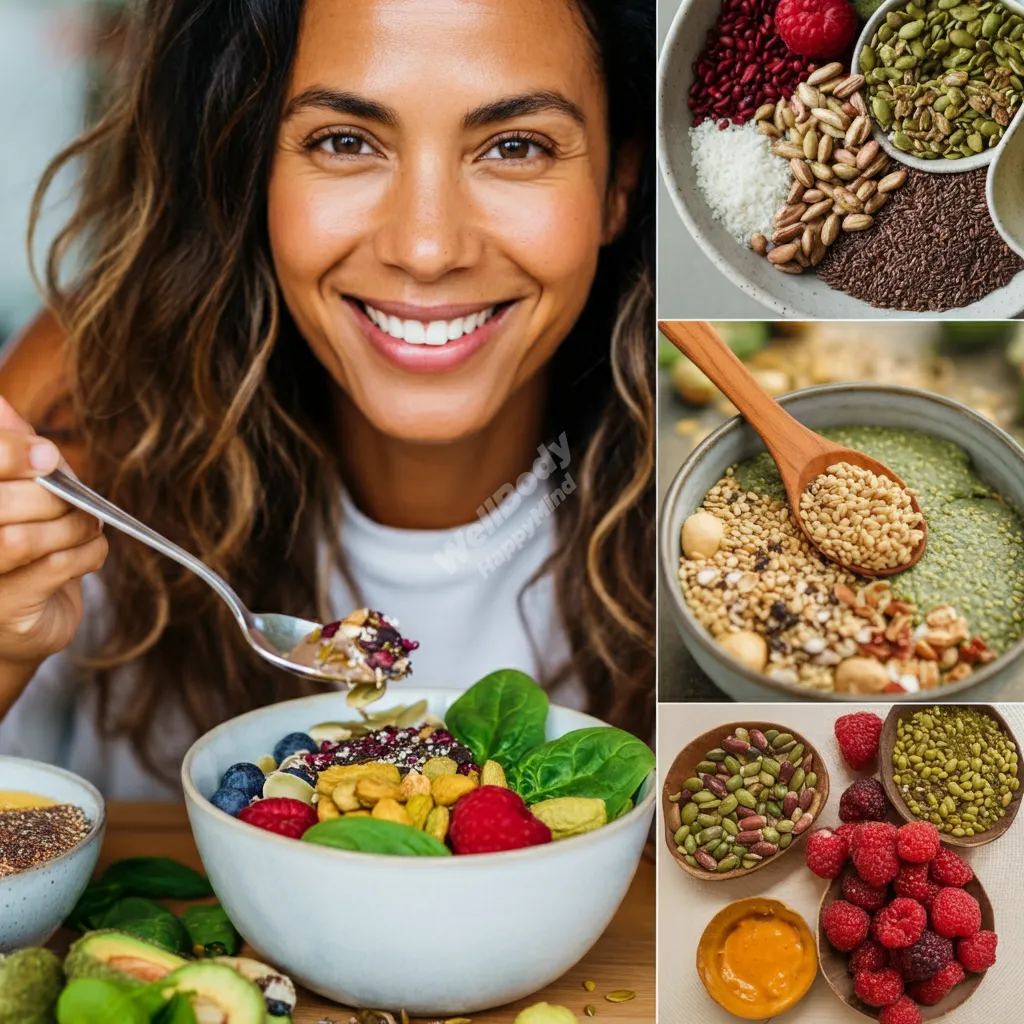
As we’ve explored throughout this post, boosting your immunity isn’t about a single miracle food or supplement. It’s about embracing a holistic approach to health that includes a variety of nutrient-rich superfoods and positive lifestyle habits.
Let’s recap our 12 immune-boosting superfoods:
- Citrus Fruits
- Berries
- Garlic
- Ginger
- Spinach
- Yogurt
- Almonds
- Turmeric
- Green Tea
- Sweet Potatoes
- Kiwi
- Salmon
Each of these foods brings its own unique set of nutrients and benefits to the table. By incorporating a variety of these superfoods into your daily diet, you’re providing your body with a powerful arsenal to support your immune system.
Remember, the key to reaping the benefits of these superfoods is consistency and balance. Aim to include a diverse range of these foods in your meals regularly, rather than focusing on one or two occasionally.
However, superfoods are just one part of the equation. For optimal immune health, don’t forget the importance of:
- Getting adequate sleep
- Regular exercise
- Managing stress
- Staying hydrated
- Maintaining good hygiene
By combining these immune-boosting superfoods with a healthy lifestyle, you’re setting yourself up for a stronger, more resilient immune system. Here’s to your health!
